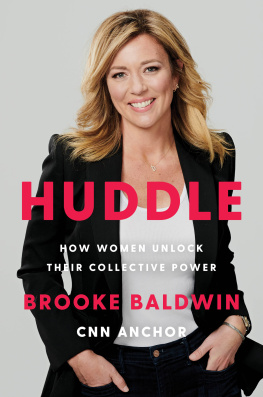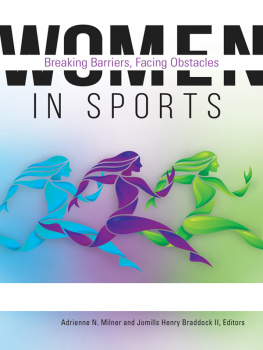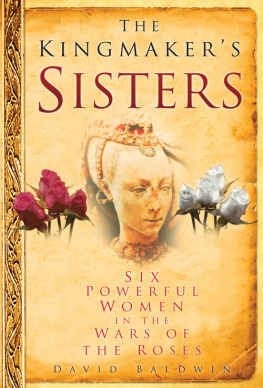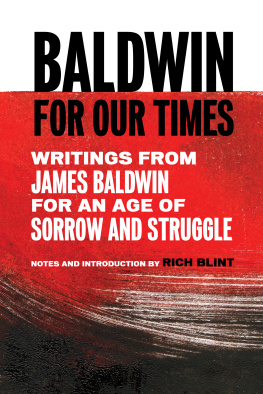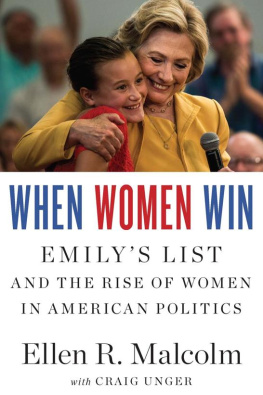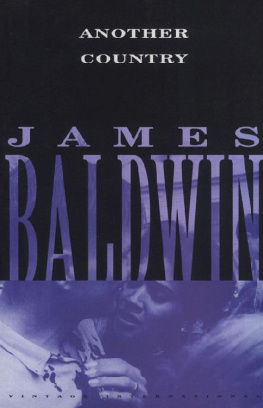Contents
Guide
For my Mom
my original huddle.
How do you hold a moonbeam in your hand?
I love you.
Also for James
my husband.
Thank you for loving me and Pugsley and for being
one of many good men who support women huddling.
I am continually moved to discover I have sisters.
I am beginning, just beginning, to find out who I am.
Gloria Steinem, from her 1972 essay Sisterhood
Contents
A group of women in Selma, Alabama, gather to steel themselves for five days of marching. Their ancestors waged the battle for voting rights many decades prior, and today they will continue the fight. Tear gas and billy clubs await them, but together they summon their strength and courage for the journey.
One woman at a podium addresses the nation for the very first time as Americas first female vice president elect. Although she stands alone on the stage, she reflects on the generations of women who came before herwomen who fought, struggled, and paved the way for her success.
Dozens of women in Silicon Valley enter their salaries on a publicly shared spreadsheet, encouraging their male coworkers to do the sameall in an effort to shine a light on gender-based salary gaps at their tech company. Later, the women team up with other prominent female peers to form an organization that will advocate to diversify their entire industry.
More than a hundred teenage girls board a flight flown by a female pilot and operated by an all-female crew. They are celebrating Girls in Aviation Day and heading to NASA in Houston, where they will meet female astronauts and begin to dream about their future careers in aviation.
Two women go surfing off the coast of Encinitas. One is suffering a recent heartbreak, and the other is there to hold her hand.
What do each of these scenarios have in common? Each is a huddlea moment that brings women together in any time or placewhether on the front lines of a public protest or in a quiet church basementto provide each other with support, empowerment, inspiration, and the strength to solve problems or enact meaningful change. Huddle is a word associated with masculinity and sports. But what if we flipped it on its head and feminized it? Its a noun. Its a verb. And its time for us, as women, to own it.
A huddle is a place where women can become energized by the mere fact of their coexistence. A huddle is where we can uplift each other to succeed, thrive, and if I mayget amazing shit done. And even though huddles are productivethey create the conditions for change, progress, and transformationthey arent always results-oriented. Sometimes they are a space where women can simply bear witness for each other, or quietly sustain each others very survival. And while there is certainly strength in numbers, there can also be incredible huddle energy between just a few women. Maybe youve felt the undeniable power between two women who make the simple and life-changing decision to lean on each other.
I know women arent always great to each other. When we compete or trash each other, we miss out on something incredibly valuable. One of the most potent resources we have is each other. I cant say we are each others most powerful resource, because as I write this prologue in 2020, I think most might say the greatest prize for women would be more seats at the table (or maybe to just rebuild the entire table, as many women I interviewed for this book told me). And also, equal pay. Representation. Recognition of the intersecting parts of our identities (our race, class, religion, sexual orientation, age, illness, and disability) that determine our access to power and influence how we move through the worlda world that isnt yet fair or just to all. But beyond those resources, I think women truly are each others most valuable asset.
And when I started to notice this, I found myself thinking, I cant be the only woman thinking this, right?
Let me slow my roll and recognize the dramatic nature of that question. In my twenty years as a journalist and news anchor, Ive learned to ask provocative questions; to look for incisive answers at the service of a public who needs to know more. But in reality, there are plenty of women talking about huddling right now. I just didnt realize it. So I turned the question on myself:
Why havent I been huddling more intentionally in my own life?
Whos in my huddle? Do I even have a huddle?!
Do I fully appreciate this incredible legacy of huddling Ive been lucky enough to inherit as a woman?
Why am I not devoting every moment of my spare time outside my day job at CNN investigating this incredible phenomenon that is happening all around me?
After being stirred by these questions in 2017, I made a decision to pay closer attention to what women were doing in America. I created a series for CNN Digital called American Woman, and then I launched the journey that became this book. Was this a professional decision? A personal passion? Both? I didnt know exactly. But as a career journalist, I felt compelled to follow my gut and see where that aching question might lead me.
I was born and raised in the South in the 1980sa time and place where upper-middle-class white girls rarely huddled for anything that didnt involve sequins or tap shoes. From a young age, I always felt my calling in journalism. After graduating from the University of North Carolina at Chapel Hill in 2001, I moved to small-town America, where I worked holidays, weekends, and overnights, often writing, producing, and anchoring my shows while rolling the teleprompter with my foot. And when I clocked out, I rarely had any good girlfriends to hang out with. Several moves to various other cities and a decade or so later, I landed back in my hometown of Atlanta, where at age thirty-one, I became one of the youngest peoplemale or femaleto anchor my own show at CNN.
Since 2008, my career at CNN has taken me all over the world to report on everything from natural disasters to shootings and terror attacks. Ive also had the privilege of meeting presidents and interviewing former first ladies, members of Congress, scientists, teachers, nurses, astronauts, actors, activists, rock stars, and ordinary Americans whove found themselves in extraordinary circumstancessuch as surviving mass shootings, hurricanes, or COVID-19. And, of course, I spent much of 2015 and 2016 covering the wildest presidential campaign we reporters thought we would ever see in our lifetimeuntil 2020 rolled around. Since my show airs in the middle of the afternoon when news tends to break, I am often live on camera, experiencing historic moments in real time right along with the rest of the nation. I have lost count of the number of times the teleprompter had gone blank and I began ad-libbing a major breaking news story with just bits and pieces of information coming in from the control room.
I love my job and the opportunity it gives me to connect with other people. I feel privileged to have a front-row seat to history, to engage in difficult dialogue, to celebrate our victories, and to broadcast the moments that shape our collective conversations and memories. Im especially grateful for this window to the world, this opportunity to listen and observe. And during some of the most remarkably newsworthy years of my lifetimethese last five yearsIve noticed something vitally important was happening with women. But it doesnt surface on the news often enough.
In examining this phenomenon of women huddling, I also began to take stock of my own lifemy family, my friends, my community, and my occupation. I realized that as someone who considered it the greatest compliment to be called a womans woman, I had ironically picked a career where I was surrounded by men. Like many white-collar jobs in America, journalism is still largely male-dominated. In the hierarchy at my job, I report to several men, and my most accomplished peers are and always have been men. The greatest portion of my show every single day has always been dedicated to covering some of the worlds most powerful men. In fact, in the time since I began writing this book, one man, Donald Trump, not only dominated the news, but he also turned the entire news cycle on its head. Most journalists will tell you, regardless of their politics, that their jobs look very different today than they did in 2015. When you add the COVID-19 pandemic, the movement against widespread systemic racial injustice, and the uptick in climate-fueled natural disasters, there isnt a lot of room left for good news these days. People used to stop me in the airport (you know, in the Before Times when we used to fly places) to ask me, How do you do it? How do you stay sane? And even though I always had an answer (that I believe in capital J Journalism and seeking the truth), what I really wanted to say was:

